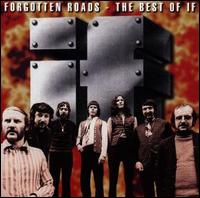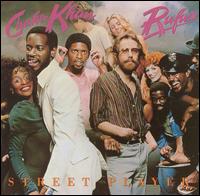
Ella and Basie! is a 1963 studio album by Ella Fitzgerald, accompanied by Count Basie and his orchestra, with arrangements by Quincy Jones. It was later reissued with slightly different cover art as On the Sunny Side of the Street.

If was a British progressive rock and jazz rock band formed in 1969. In the period spanning 1970–75, they released eight studio-recorded albums and undertook 17 tours of Europe, the US and Canada. The band were acclaimed by George Knemeyer in a Billboard concert review as "unquestionably the best of the so-called jazz-rock bands".

Blues Cross Country is a 1962 studio album by Peggy Lee, principally arranged by Quincy Jones, with some arrangements by Benny Carter. The album can be described as a concept album, consisting of a musical journey across the United States through swinging blues songs, many of which were written by Lee with other contributors.
Morrissey–Mullen were a British jazz-funk/fusion group of the 1970s and 1980s.

...Allow Us to Be Frank, a Rat Pack tribute, is the fifth studio album, sixth major album release under Sony BMG and first cover album by Irish boy band Westlife; it is also the first album since the departure of Brian McFadden and as a four-piece. It was released on 8 November 2004, and peaked at number two in Ireland and number three in the United Kingdom. ...Allow Us to Be Frank was number twenty-four on the 2004 year-end album charts. The album features songs made popular by Frank Sinatra such as "The Way You Look Tonight", "Come Fly with Me", "Moon River", "Summer Wind" and "That's Life". It also includes the Nat "King" Cole song, "When I Fall in Love". It was recorded with a 60-piece orchestra at Phoenix Studios in Wembley, in the London Borough of Brent.

Terence Smith is a British jazz guitarist.

If, often referred to as If 1, is the eponymous debut album by English jazz rock band If. It was released in October 1970 on the Island Records label in the UK and Capitol Records in the US. The original artwork and the if logo, which was an award-winning design, were by CCS Advertising Associates.

If 3 is the third release by the English jazz rock band If. It was released in August 1971 by United Artists Records (U.K.) and Capitol Records (U.S.) and reached #171 on the Billboard Pop Albums Chart. It was reissued in CD in 2006 by Bodyheat with 2 bonus tracks, then by Repertoire in 2007 with 2 different bonus tracks.

If 4 is the fourth album released by the English jazz rock band If. It was first issued in 1972 and the last album to feature the original recording line-up. Capitol Records, the band's U.S. label, declined to issue this fourth album. Most of the tracks on this album were issued in the U.S. on Waterfall, in a slightly different form, by Metromedia Records.

Waterfall is the fifth album released for the American market by the English jazz rock band If. It was first issued in 1972 and reached #195 on the Billboard Pop Albums Chart.

Miles & Quincy: Live at Montreux is a collaborative live album by American jazz trumpeter Miles Davis and conductor Quincy Jones. It was recorded at the 1991 Montreux Jazz Festival and released by Warner Bros. Records in 1993.

Double Diamond is the sixth album by British jazz-rock group If and the second to be issued in the U.S. on the Metromedia Records label. With only Dick Morrissey left from the original band, the new line-up featured Fi Trench (keyboards) and Pete Arnesen (keyboards), Steve Rosenthal, Kurt Palomaki (bass) and Cliff Davies (drums). It was recorded at The Manor recording studios shortly after Mike Oldfield's Tubular Bells, and released in 1973.

Forgotten Roads: The Best of If was British jazz-rock group If's first compilation album, released on CD twenty years after the band's dissolution in 1975. The tracks and line-up were from the first three If albums. It was followed two years later by a collection of live recordings from tours in Europe.

Europe '72 (Live), released in 1997, is a compilation album of live performances by British jazz-rock group If. It features material from their first four LPs that was recorded live on tour and before studio audiences. The extensive liner notes, giving an exhaustive background on the band, were written by UK music critic Chris Welch.

J.J. Jackson's Dilemma is the fourth album by J. J. Jackson and his second recorded in the UK.

Street Player is the sixth studio album by funk band Rufus, released on the ABC Records label in 1978. Street Player was the band's third album to top Billboard's R&B Albums chart and also reached number 14 on Pop. The album includes the singles "Stay" and "Blue Love".

Numbers is the seventh studio album by funk band Rufus, released on the ABC Records label in 1979. It was the band's first album without Chaka Khan on lead vocals. Instead, band members Tony Maiden and David "Hawk" Wolinski shared lead vocal duties, with additional female leads by Helen Lowe and Maxayne. The album reached #15 on Billboard's R&B Albums chart, #81 on Pop and included the single release "Keep It Together ".

Smackwater Jack is a 1971 studio album by Quincy Jones. Tracks include the theme music to Ironside and The Bill Cosby Show.

This Is How I Feel About Jazz is a 1957 album by American musician Quincy Jones, his first full-length album as a bandleader after a recording debut with the 1955 split album Jazz Abroad.

Sinatra at the Sands is a live album by Frank Sinatra accompanied by Count Basie and his orchestra, and conducted and arranged by Quincy Jones, recorded live in the Copa Room of the former Sands Hotel and Casino in Las Vegas in 1966.



















